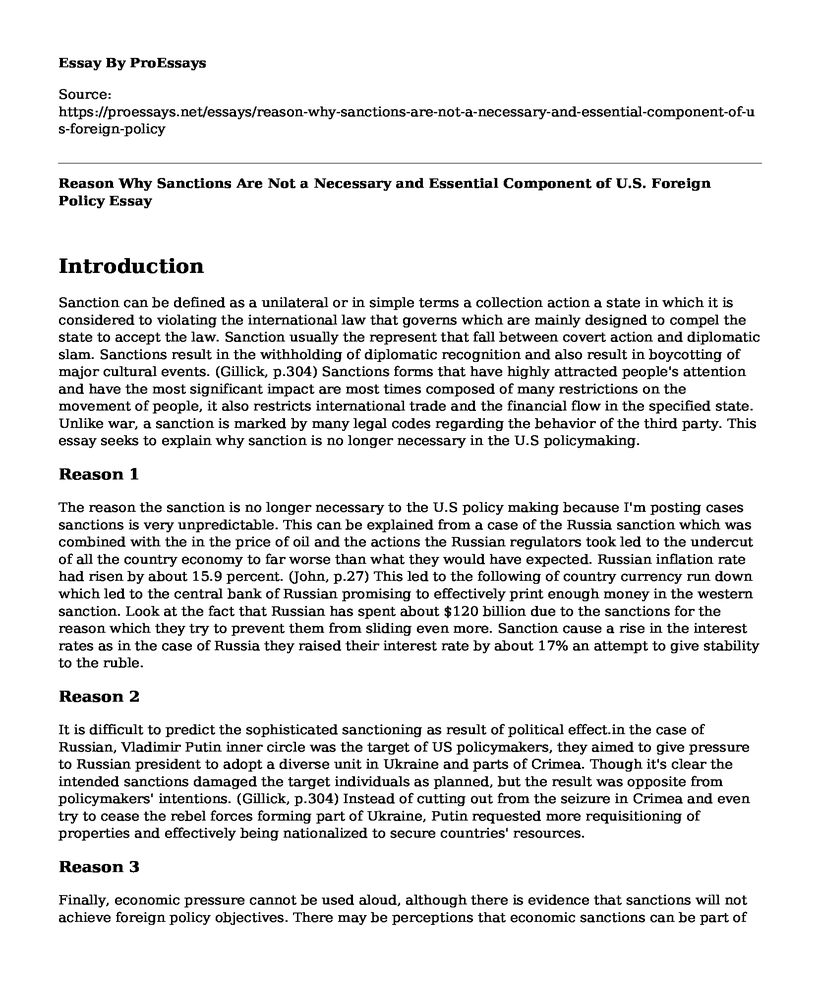Introduction
Sanction can be defined as a unilateral or in simple terms a collection action a state in which it is considered to violating the international law that governs which are mainly designed to compel the state to accept the law. Sanction usually the represent that fall between covert action and diplomatic slam. Sanctions result in the withholding of diplomatic recognition and also result in boycotting of major cultural events. (Gillick, p.304) Sanctions forms that have highly attracted people's attention and have the most significant impact are most times composed of many restrictions on the movement of people, it also restricts international trade and the financial flow in the specified state. Unlike war, a sanction is marked by many legal codes regarding the behavior of the third party. This essay seeks to explain why sanction is no longer necessary in the U.S policymaking.
Reason 1
The reason the sanction is no longer necessary to the U.S policy making because I'm posting cases sanctions is very unpredictable. This can be explained from a case of the Russia sanction which was combined with the in the price of oil and the actions the Russian regulators took led to the undercut of all the country economy to far worse than what they would have expected. Russian inflation rate had risen by about 15.9 percent. (John, p.27) This led to the following of country currency run down which led to the central bank of Russian promising to effectively print enough money in the western sanction. Look at the fact that Russian has spent about $120 billion due to the sanctions for the reason which they try to prevent them from sliding even more. Sanction cause a rise in the interest rates as in the case of Russia they raised their interest rate by about 17% an attempt to give stability to the ruble.
Reason 2
It is difficult to predict the sophisticated sanctioning as result of political effect.in the case of Russian, Vladimir Putin inner circle was the target of US policymakers, they aimed to give pressure to Russian president to adopt a diverse unit in Ukraine and parts of Crimea. Though it's clear the intended sanctions damaged the target individuals as planned, but the result was opposite from policymakers' intentions. (Gillick, p.304) Instead of cutting out from the seizure in Crimea and even try to cease the rebel forces forming part of Ukraine, Putin requested more requisitioning of properties and effectively being nationalized to secure countries' resources.
Reason 3
Finally, economic pressure cannot be used aloud, although there is evidence that sanctions will not achieve foreign policy objectives. There may be perceptions that economic sanctions can be part of "American warfare", in addition to the more definitive threats of power and increase the damage they can do a little bit. As in Iraq, Bosnia, and Haiti, US leaders often use restrictions on domestic deportation, not international coercion, to give the opportunity to then reject criticism of peaceful use. The continued failure of sanctions suggests that the reasons for hiring the state should be somewhere else. Among the key questions is whether decision makers who impose sanctions systematically exaggerate the possibility of the fall of oppression. Whether leaders are often questioned the main way military forces often expect that sanctions will increase the credibility of the upcoming military threat. (John, p.27) Does impose sanctions on North Korea generally lead to more domestic political interest than leaders refuse to impose sanctions or impose sanctions?
Works cited
Johnson, James Turner, and John Kelsay, eds. Cross, Crescent, and Sword: The Justification and Limitation of War in Western and Islamic Tradition. No. 27. Greenwood Press, 1990.
Fried, Terri R., and Muriel R. Gillick. "Medical decisionmaking in the last six months of life: Choices about the limitation of care." Journal of the American Geriatrics Society 42.3 (1994): 303-307.
Shu-Fang, M. E. N. G. "Adjustment and Its Limitation with the Sanction to the Civil and Military Officials in the Qianlong Period." Journal of Inner Mongolia University (Philosophy and Social Sciences) 5 (2009): 019.
Cite this page
Reason Why Sanctions Are Not a Necessary and Essential Component of U.S. Foreign Policy. (2022, Sep 22). Retrieved from https://proessays.net/essays/reason-why-sanctions-are-not-a-necessary-and-essential-component-of-us-foreign-policy
If you are the original author of this essay and no longer wish to have it published on the ProEssays website, please click below to request its removal:
- GDP and Standards of Living Between Germany and Indonesia - Research Paper
- Role of Law, Policy, and Evidence in Developing a Local Plan - Paper Example
- The Tokyo Housing Crisis - Paper Example
- Essay Sample on The Child Rearing Practices
- Essay on Nurse Practitioners: Impact of Regulatory Policies on Advanced Practice Nursing
- CUEED: Reimagining Policy Change for Urban Economic Development Amidst Covid-19 - Essay Sample
- Essay Example on School Uniforms: An Ongoing Debate in the Contemporary World







